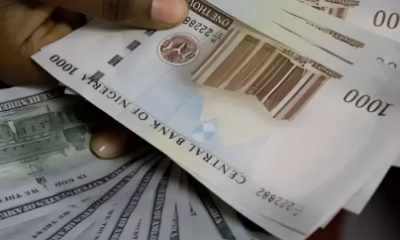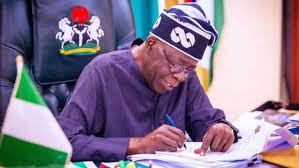By Odunewu Segun
The Nigerian Naira, at the weekend, surged at the parallel segment of the Nigerian Foreign Exchange market, exchanging flat at N367/$.
Against the British Pound Sterling, the Naira closed at N477 and closed at the rate of N430 against the European single Currency, Euro.
The Naira appreciated by +0.47% to N364.78 against the USD and +0.16% to N473.32 against the GBP at the IEFX window today while it shed -0.48% to N430.08 against the EUR.
Data from the Financial Market Dealers Quote (FMDQ) showed that the indicative exchange rate for the window, also known as, Nigeria Autonomous Foreign Exchange, NAFEX, dropped to N366.5 per dollar at the close of business on Friday from N367.5 per dollar on Wednesday.
This translated to appreciation of N1 for the naira as well as N1.67 appreciation in two consecutive days.
Meanwhile, on the international scene, US Dollar traded down across the board following the release of July inflation figures which narrowly missed consensus estimates but showed an increase from the previous month.
The ICE Dollar Index DXY, -0.50% which measures the greenback against a basket of six rival currencies, dipped into negative territory following the data release, trading at 93.2170, down from 93.460 earlier on Friday.
The consumer price index climbed 1.7% on the year versus expectations of 1.8% and the June figure of 1.6%. Core inflation excluding food and energy came in at 1.7%, in line with estimates and June numbers.
Low inflation numbers have kept investors as well as the Federal Reserve on their toes, as disappointing numbers weighed on the possibility that the Fed could raise interest rates again or more aggressively.
The euro EURUSD, +0.5521% spiked on the back of the release, buying $1.1808, up from $1.1774 late Thursday in New York, while the pound GBPUSD, +0.2389% briefly jumped to $1.2988, compared with $1.2978 on last week. Both currency pairs retreated from their initial highs earlier on Friday.
ALSO SEE: Naira bounces back as Dollar tumbles against rival currencies
The euro EURGBP, +0.2976% also continued to strengthen against the Brexit-ridden pound, with one euro buying £0.9098 compared with £0.907 late on Thursday.
The pair was last in £0.9 territory in November 2016. The OECD outlook said the U.K. was en route for slowing growth earlier this week as uncertainties about the post-Brexit economy remain.
That helped to push up currencies perceived as safer assets, like the Japanese yen and Swiss franc. The dollar USDJPY, -0.21% fetched ¥109.04, slightly up ¥109.20 on Thursday, while the Swiss franc CHFUSD, +0.1873% bought $1.0396, up from $1.0389.
Other Asian currencies, however, stumbled on fears of a conflict in the region. Against the South Korean won USDKRW, -0.22% the dollar dipped to 1,142.03 won on the inflation numbers, after initially rising to 1,146.41 won earlier on Friday versus 1,144.16 won on Thursday.

 Latest3 days ago
Latest3 days ago
 Trends4 days ago
Trends4 days ago
 Education1 week ago
Education1 week ago
 Business6 days ago
Business6 days ago
 Football6 days ago
Football6 days ago
 Featured6 days ago
Featured6 days ago
 Health5 days ago
Health5 days ago
 Featured1 week ago
Featured1 week ago













